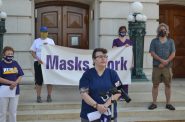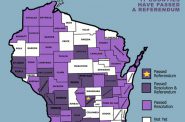White Landlords Wouldn’t Rent to Us
Lyneria McGhee remembers why her family got involved in open housing marches.
In the 1960s, African-Americans were limited to purchasing homes on Milwaukee’s North Side simply because of the color of their skin. As a young black girl, Lyneria Childs McGhee always questioned this.
“That was a big issue for me coming up,” she added. “Well, how come we can’t do this? How come we can’t buy here? Why can’t we move there?”
This was of great importance to her because the size of McGhee’s family made it difficult for them to find adequate places to live. Additionally, some property owners would refuse to sell to them.
“The white landlords wouldn’t rent to my dad,” McGhee said. “He needed at least three bedrooms with the eight of us.”
McGhee’s family finally tracked down a house on the corner of 5th and Chambers streets that suited their needs. However, it was a struggle at times to pay for rent, food and unexpected hospital bills. The Rev. James Groppi, a pastor at St. Boniface Catholic Church, did as much as he could to support the McGhee family in their time of need.
With Groppi’s encouragement, all of the McGhee children got involved in the open housing marches. In 1967, Lyneria McGhee, then 14, joined the NAACP Youth Council. In August, Youth Council members began a 200-night demonstration for open housing policies in Milwaukee.
All 200 nights were filled with anticipation for McGhee and her siblings, but before they could go on the marches they had to finish their homework. McGhee recalled a situation in which her sister Mary Ann was unable to attend a march.
“Mary Ann couldn’t go once because she had a math problem she couldn’t solve. She was pretty upset,” McGhee said with laughter. “It was about 10 p.m. and my dad goes to bed early because he has to get up for work. So he got out of bed and he stayed up to help her solve her problem.”
On each of the 200 nights counter-protestors demonstrated against open housing. Although some of these protestors were violent and shouted hateful words, McGhee did her best not to look down on them.
“They had never interacted with blacks. All they knew was ‘black had to get back,’” McGhee said. “I don’t know if it was instilled in them, if they knew any black people or if they were just taught that without getting to know a black person.”
On April 30, 1968, Milwaukee finally passed open housing legislation. Congress later passed a law that made it illegal to refuse to sell or rent houses to someone based on their race, color, religion, sex, familial status or national origin.
McGhee resides today at Northlawn, 5145 N. 20th St., a predominantly black affordable housing community run by the Housing Authority of the City of Milwaukee. It is not how she envisioned her adult life as a child.
“I had this idea of the American dream, traveling and retiring. I just wanted to be comfortable,” McGhee said. “But this place is the best I can do in my current financial situation.”
This story was originally published by Milwaukee Neighborhood News Service, where you can find other stories reporting on eighteen city neighborhoods in Milwaukee.
50 Years After The Marches
-
Pandemic Shines Spotlight on Workers’ Struggle
 Sep 7th, 2020 by Erik Gunn
Sep 7th, 2020 by Erik Gunn
-
UW System Expects $212 million in Losses
![Van Hise Hall in the background. Photo by James Steakley (Own work) [CC BY-SA 3.0 (https://creativecommons.org/licenses/by-sa/3.0) or GFDL (http://www.gnu.org/copyleft/fdl.html)], via Wikimedia Commons](https://urbanmilwaukee.com/wp-content/uploads/2017/10/1017px-Ingraham_Van_Hise_carillon-185x122.jpg) May 8th, 2020 by Rich Kremer
May 8th, 2020 by Rich Kremer
-
51 of 72 Counties Now Back Fair Maps
 Apr 15th, 2020 by Matt Rothschild
Apr 15th, 2020 by Matt Rothschild





















